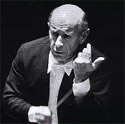Taming the Decibels again

There is one fundamental physical law that bears repetition, since so many musicians are unaware of it; a sustained note is always stronger than a moving voice Erich Leinsdorf
Watch Erich Leinsdorf on YouTube
Below, in response to some ear-bending concerts by wind and brass world wide, is a little diatribe about the noise in band concerts. We can take a leaf from our orchestral colleagues in making music work, and below I once again revisit my Conducting pages and the thoughts of some of the great conductors on how to balance an orchestra; they all work for band too. Anyone from overseas who wishes to follow up ideas from these web pages on repertoire and interpretation might well consider attending the Canford (now renamed Sherborne) Summer School of Music Conducting Course for Wind Ensembles and Bands to study with myself and colleagues Mark Heron and Russell Cowieson.
RAMP
This Homepage starts with another mnemonic to go with EMIT (Factors for choosing repertoire - Emotion - Musical qualities - Intellectual challenge - Technical challenge) RAMP, of which more below.
I am back in USA for the Fall after a most interesting and exciting tour which has done wonders for my air miles. Throughout the trip, I kept wondering why such an exciting ensemble as the wind orchestra is still struggling for recognition. Apart from the most obvious rationale, that we have few great professional ensembles or conductors as role models, I think there are four other main reasons.
RAMP
REPERTOIRE - ACOUSTICS - MEDIA - PRESS REVIEWS
R - REPERTOIRE
First, we tend to commission and to pick repertoire which inevitably sounds brilliant but which does not necessarily develop musicianship in either performers or audience, or indeed ourselves. There is a "band" type of writing which makes our groups sound great but which rarely plumbs the emotional depths of the orchestral, operatic or chamber repertoire. We still need to seek out those more important composers and their works from the international repertoire, and then programme such works with confidence in our players and audiences. Our choice or repertoire is often governed by commercialism, and many of the best pieces are not promoted by the band industry. Could we not share information on significant literature via the websites of our great band organizations, ABA, ABODA, BASBWE, CBA, CBDNA, NBA, JBA, TBA, WASBE, etc.
A - ACOUSTICS
Very often our concerts are of repertoire which needs large spaces, but they are equally often given in general purpose halls, theatres or gymnasiums with an unflattering acoustic, often painful in high dynamics or muddy in tutti passages.
M - MEDIA
We need the oxygen of media coverage on radio and television, on recordings and performances in the world's great concert halls and festivals. The current series for Naxos by John Lynch and the University of Georgia Wind Ensemble, distributed internationally, should be a prototype for the future. Wouldn't it be great if ABA, ABODA, BASBWE, CBA, CBDNA, NBA, JBA, TBA, WASBE and the rest shared information on line about exciting new literature, new recordings, new commissions, tours, major concerts in international venues, not only with us members who are starved of this information, but also with the world's music press who still do not realize we exist.
P - PRESS
Finally we desperately need critical appraisal in the national and international press. Reviews are rare and even important concerts are ignored by the critics. Publicity concentrates on the social side. I remember a review of the 1987 WASBE Conference which highlighted the attendance at the clam-bake but hardly mentioned the music.
Enough from Grumpy Old Man of Leyland, UK. I have been lucky enough this year to give concerts in Australia, Singapore, Venezuela and USA which dealt with many of these problems; great concert halls in Singapore, Caracas and the University of Athens, Georgia, professional reviews in Adelaide and Singapore, and great repertoire with plenty of rehearsal time with all four wind orchestras.
As usual, if you want further information on any of these programmes, please email me at timreynish@tiscali.co.uk. I get back to UK on the 8th December after a week of clinics and concerts for my old friend and colleague, Jessica Kun, at Wilfrid Laurier University in Canada. As well as giving the Canadian premiere of Brett Abigana's Sketches on Paintings no. 2, I hope finally to help Dr. Jessica Kun nail the many misprints in the new Boosey and Hawkes edition of Toccata Marziale. Last week in Georgia we found another three wrong notes in the low brass; final list up I hope for Christmas.
During these months, I have heard a great deal of band music, which very often could have made a bigger impact. On reflection, there is another big reason why the band world is not taken seriously, and that is the noise factor. The easiest thing for us to do with our band is to make a noise. The most difficult is to give clarity to the score by making accompaniments light, keeping syncopations light, helping the players to appreciate the relative strengths of their instrument and how it should be contributing at any given moment. That is where we need to develop our conducting technique, to put across the messages about the score which the composer has hidden behind those simple coded dynamics. I have added a few thoughts on balance from the great conductors, particularly Erich Leinsdorf. Anyone interested can find more of this material on my website under Conductors.